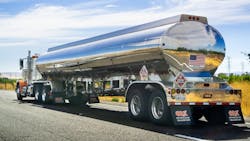With all the talk about zero-emission vehicles, I think the industry may have lost focus on what's happening with diesel trucks. According to a recent Diesel Technology Forum report, the use of near-zero emission trucks increased by 10.2% from 2021 to 2022. To be clear, these are not zero-emission trucks but diesel trucks with diesel particulate filters and selective catalytic reduction systems that cut down on the emissions from the tailpipe.
Nearly two-thirds of all Class 3 to 8 diesel trucks operating today are model year 2007 or newer, and they are much cleaner than pre-2007 trucks. In addition, many fleets are investing significantly in technologies like aerodynamic devices for tractors and trailers, low-rolling resistance tires, tire pressure monitoring systems, automated manual transmissions, and more. They are also making some operational changes, such as setting electronic engine parameters to optimize fuel economy, limiting speed, and teaching drivers to drive with fuel economy in mind. These investments and practices mean that fleets are going more miles on a gallon of gas, and that means they are using less fuel to move goods.
See also: Roeth: Lest we forget decarbonizing with diesel
This is a good thing because diesel-powered trucks are not going away any time soon. While we have seen tremendous strides in developing alternative-fueled vehicles—especially battery-electric and hydrogen fuel cell—we are nowhere near the tipping point in their adoption curve. At this point, battery-electric vehicles don't have the range needed for long-haul applications, and we've yet to build the infrastructure to allow fueling at places other than a fleet's depot. I am sure we will continue to see improvements in battery range and infrastructure, but those things take time. In addition, we still need to make the total cost of ownership case for these trucks to make sense.
With truck makers returning to more normal production levels, fleets will be able to get back to their normal asset replacement cycles, and we will continue to see an increase in near-zero emission diesel-powered trucks . For that reason, diesel should not be overlooked as part of the solution for a cleaner trucking future.
Patrick Gaskins, SVP of Corcentric Fleet Solutions, oversees both sales and operations for the company's fleet offerings. Gaskins joined the company in 2010, bringing more than 30 years of experience as a financial services professional in the transportation industry. He leads a team that works with a supply base of more than 160 manufacturers to help the country's largest fleets manage all aspects of their fleet operations and fleet-related spending.
About the Author

Patrick Gaskins
Senior vice president, Fleet Solutions
Pat Gaskins is the senior vice president of Corcentric Fleet Solutions, where he leads both the sales and operations teams for the company’s fleet offerings. He has over 30 years of experience as a financial services professional in the transportation industry and manages partnerships with over 160 manufacturers, helping over 2,000 of the country’s largest fleets manage all aspects of their fleet operations and fleet-related spend.
